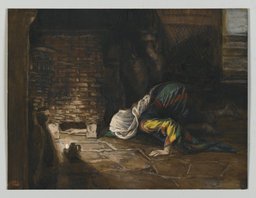Luke 15:1-10 CEB If you want to be successful on the internet here is a must: Stick to one side of the spectrum. Don't ever sway from that spectrum. If you can't do that and want to live in the middle, make sure to do it without really speaking your voice. Say a bunch of something without saying anything at all. People don't want to hear your opinion. They want their opinion validated. In this realization, we must be in trouble here. I have never been concerned with following the hard line of right or left, liberal or conservative, traditional or radical. I have been far more concerned in trying to get it right, even if what is right might draw ire from those who just want to hear the right words to validate something they already believe is true. Oops.  For those of you who are here every week, you already know I immerse myself in prayer with this question: If Jesus had the internet, how would he interact with it? I have a growing realization he would probably be ignored. See, he never spoke to try to validate an already believed point. He said what was right. He hardened his resolve over and beyond hardening his heart. I have this growing realization Jesus would have trouble getting the page hits to his website, because he couldn't pick that group or person to ostracize. (I have to note, I know some really great bloggers. This is not indicative of all who share on the internet, just a realization of a very popular method of how writers get hits to their websites.) His words still angered and ostracized people, but those people chose to cut themselves from the message. They were not cut out of the conversation by the message. There are two truths I pull from this scripture. I realize focusing on one over the other would garner more shares and likes. These two truths come from both sides of the spectrum and accepting both require opening your heart over and beyond your ideology. (BTW-We all have ideologies.) She is God Here is a crazy idea: the woman in the parable is an illustration for God. I know, it is hard to wrap your head around.Those who have spent the greater part of their lives in church, might have only heard masculine language for God. It's difficult to hear Jesus might have used a female illustration to describe Her. In this case, like other Luken moments, Jesus shares two parables, one featuring a male and one featuring a female. Both the parables share the same message, so why tell the same story twice? I say culture. The first parable uses an understood image for God, the good shepherd. People could easily see this There would be no need to share the second parable. Yet, he does. This a moment where the image of God is expanded. God is like a woman who lost a coin. Scandalous. Not the middle of the road message either side of the listening body could easily take. For a masculine centered world, the sinners in the audience would have turned an ear while being taken aback. For a Pious rule-following elite, this would have angered the religious body in the audience beyond their initial anger. So, what can we take from duality of the parables? We are all images of God. Male and Female- we are all made in God's image.God comes to us as the widow, the wife and those who are considered less than. This is about 100% This isn't an all or nothing game, because sometimes the money is lost. Sometimes the wolves devour the sheep before the Shepherd can find it. This is an all for the sake of all game. It means we celebrate when the sheep is found, and mourn when the coin is actually lost. There is no room for, "Well, they will get what's coming to them." There is no anger in this game. There is only joy or remorse. I clearly see the Occupy Wallstreet movement in opposition to this scripture. I wrote about it months ago, and my opinion stands. The difference between then and now is I believe I can articulate my beliefs better. We need to realize who we are 'othering,' or setting apart from everyone else. Are we the ones throwing the sheep out into the wilderness; dropping the coin behind the dresser? The Occupy movement gives this perception like we should cut off the 1%. They are lost without any hope for redemption. What the Occupy movement did for Christianity was gave us a group to shine the light one and search for. In reality the Occupy movement has brought the radical truth of this parable to the forefront. Sometimes the one is the rich, powerful, and elite. God wants this group to find salvation too. As humans we all have those people who we would rather leave in the wilderness. The religious elite in the parable pointed to sinners. I struggle with those who have inflicted mental scars on me personally. I didn't cause the inflictors to be lost, but I sometimes wish the people who have caused those wounds would simply stay behind the dresser. Yet, God, merciful loving God, wants us all. The wounder and wounded. The poor and the rich. The sinner and the 'pious.' God wants redemption for everyone and everyone is made in the image of God. Maybe, at least, we can all get behind that. For, "joy breaks out in the presence of God’s angels over one sinner who changes both heart and life.” Like what you are reading? Join the conversation on Reddit! http://www.reddit.com/r/FigTreeChristian/ . There you can also share blogs and articles that extend the discussion, or just add to the discussion on this meditation. Either way, look forward to seeing you there! Also, if you are in the Atlanta area consider coming to the planning on Sunday, October 6th . For more information check out Upcoming Events! Tissot, James Jacques Joseph, 1836-1902. Lost Drachma, from Art in the Christian Tradition, a project of the Vanderbilt Divinity Library, Nashville, TN. http://diglib.library.vanderbilt.edu/act-imagelink.pl?RC=54791 [retrieved September 15, 2013]. Original source: http://commons.wikimedia.org/wiki/File:Brooklyn_Museum_-_The_Lost_Drachma_(La_drachme_perdue)_-_James_Tissot_-_overall.jpg.
|
Categories
All
Archives
October 2023
|




 RSS Feed
RSS Feed